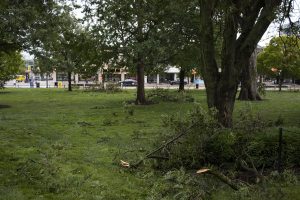EMPOWER researchers look into effect of COVID-19 mitigations on student well-being
A group of researchers, including UI College of Engineering Dean Harriet Nembhard, are looking into the effect COVID-19 mitigations have had on student’s well-being.
The Seamans Center is seen on Tuesday, August 25th, 2020. The engineering department recently was approved for a grant that allows the department to study the effects of off-campus learning on students.
August 26, 2020
Professors and researchers from institutions across the country are working to understand how changing circumstances in student’s lives are affecting their well-being during the current pandemic.
University of Iowa College of Engineering Dean Harriet Nembhard is working to survey students during the fall 2020 and spring 2021 semesters with North Carolina State University professors Julie Ivy, Maria Mayorga, and Julie Swann, and North Carolina Agricultural and Technical State University professor Lauren Davis,
In 2018, the researchers formed EMPOWER, ‘Empowering People to Achieve Optimal Well-being through Engineering Research.’ Nembhard said in an email to The Daily Iowan that the vision of the group is to establish model-based systems to help emerging adults take control over their own well-being.
RELATED: University of Iowa chemistry professor receives federal research grant
“We intend to integrate fundamental theories and methods from operations engineering, social and behavioral science, and computer and information science and engineering to design a platform for an interactive system of models that empowers decision making that improves outcomes at the intersection of health, wealth, and education, which we define as well-being,” Nembhard said.
When COVID-19 moved students off campus and into online classrooms, the team created a study to measure students’ well-being during the public-health crisis. Nembhard said the study is particularly interested in how disruption to college life affects students with behavioral health issues and housing or food insecurities.
Nembhard, a co-principal investigator on the project, added that the main objectives of the study are to assess colleges’ ability to create virtual communities through synchronous and asynchronous learning, use data to inform risk stratification on campus, and to evaluate the effect of campus policies in response to COVID-19.
The National Science Foundation is funding the project under the RAPID grant, which supports researching, “data that if you don’t capture in the moment, it’ll disappear,” said Ivy, lead principal investigator on the study.
RELATED: UI to host mental health online panel for student support during COVID-19
The researchers will survey at least 200 students each at their three campuses, as well as Duke University in North Carolina.
According to the project abstract, it will, “focus on engineering students in undergraduate programs where a component of course success is often hands-on labs and teamwork.”
Ivy said one of the ways the researchers are planning to use RAPID is to provide incentives like gift cards to participants. The fall semester will be the first iteration of the study and is planned to be renewed in the spring. Nembhard said they hope to complete the study by July next year.
UI graduate student Nicole Corcoran is one of the students working with EMPOWER as a student ambassador. Corcoran said her job is to recruit people at the university and build teams that will try to create solutions for mental health barriers during the pandemic.
Corcoran, who studies autonomous vehicles, said she is excited to be an ambassador so she can help people. It is a diversion from the more glamorous aspects of engineering that people often get caught up in, she said.
“What I really got into the work for is to make positive changes in people’s lives and doing so with an innovative mindset, which is what engineers do,” the student ambassador said. “As somebody who understands mental health and cares about it —and it’s something that I think we do not address enough as a society and as a school even — I was really excited when I saw this opportunity.”
Ivy said if the study is able to quantify elements of well-being, they may be able to identify indicators that show when there should be intervention.
“We know that college can be transformative in students’ lives,” Ivy said. “The more that we can understand and track student well-being while they’re experiencing college and as they go through college…and then it helps us overall to have a positive impact on their life course based on the experience they had during college.”






